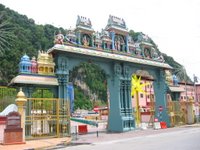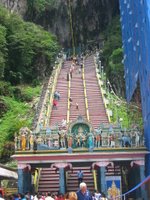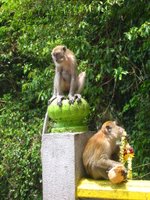 I could've easily taken a cab to the Batu Caves, but instead I decided to take the bus, as the locals would do. I've been commuting on buses back in Manila, but this is not as easy as it sounds. For one, I don't know the language, and second, I don't know the place. I took the train from KL Sentral to Pasar Seni (Central Market) station, and from there I walked about looking for the bus stop for 11D. My research on the Internet tells me the bus stop is near Bangkok Bank, but 15 minutes later I still don't see any 11D bus passing by.
I could've easily taken a cab to the Batu Caves, but instead I decided to take the bus, as the locals would do. I've been commuting on buses back in Manila, but this is not as easy as it sounds. For one, I don't know the language, and second, I don't know the place. I took the train from KL Sentral to Pasar Seni (Central Market) station, and from there I walked about looking for the bus stop for 11D. My research on the Internet tells me the bus stop is near Bangkok Bank, but 15 minutes later I still don't see any 11D bus passing by.  I asked a lady storekeeper nearby, and she was kind enough to tell me that the 11D has already been discontinued. Better for me to catch the 69 bus.
I asked a lady storekeeper nearby, and she was kind enough to tell me that the 11D has already been discontinued. Better for me to catch the 69 bus.I moved on to a plaza with a short clock tower sandwiched between two HSBC branches, and waited for my 69 bus. I didn't see any coming, so I asked one of the bus drivers waiting there which bus is going to Batu Caves. He pointed to the bus in front of him. Must be my lucky day. I thanked him, and proceeded to board bus number.....26. Hey, something must be wrong here. I got off the bus, just in time to see the bus driver drive off with an amused look on his face. Well, I may be a tourist, but I'm no dummy.
 Bus 69 eventually came. I'm sure this is the right one because a lot of other foreigners are queuing up. The bus is beat-up and dingy, but at least it's airconditioned. You have to give the driver the exact fare because they don't give change. One thing I noticed is that the locals don't their seats to the elderly. I gave my seat to one and ended up standing for 30 minutes all the way to Batu Caves.
Bus 69 eventually came. I'm sure this is the right one because a lot of other foreigners are queuing up. The bus is beat-up and dingy, but at least it's airconditioned. You have to give the driver the exact fare because they don't give change. One thing I noticed is that the locals don't their seats to the elderly. I gave my seat to one and ended up standing for 30 minutes all the way to Batu Caves. First thing you see when you get to Batu Caves is the imposing 272-step stairway that leads up to the mountaintop. Next are the macaque monkeys that seem to be everywhere. You can buy bananas and peanuts from the nearby shops to get them to approach you. Batu Caves is made up of three main limestone caves (400 meters long and 100 meters high) and some smaller ones. Inside are shrines for the Hindu gods. Once a year, the Thaipusam festival (honoring the son of Shiva) is held here, which draws as many as 800,000 devotees and visitors. People carry heavy kavadis and pierce themselves with metal hook and skewers, as a form of penance or sacrifice.
First thing you see when you get to Batu Caves is the imposing 272-step stairway that leads up to the mountaintop. Next are the macaque monkeys that seem to be everywhere. You can buy bananas and peanuts from the nearby shops to get them to approach you. Batu Caves is made up of three main limestone caves (400 meters long and 100 meters high) and some smaller ones. Inside are shrines for the Hindu gods. Once a year, the Thaipusam festival (honoring the son of Shiva) is held here, which draws as many as 800,000 devotees and visitors. People carry heavy kavadis and pierce themselves with metal hook and skewers, as a form of penance or sacrifice.
No comments:
Post a Comment